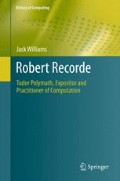Abstract
Robert Recorde’s views on the intrinsic worth of learning are scattered throughout the Dedications and Prefaces to his books. His views accord with those of Plato on counts other than the practical application of mathematics, of which Recorde was strongly in favour. He justifies the values of Arithmetic, Geometry and Astronomy individually with slightly differing emphases, but concludes that learning these subjects is basically good for you. He then sets out his intentions to publish a series of texts, written in the vernacular, that were designed to remedy the parlous state into which the teaching of mathematical subjects had descended in England by the beginning of the Tudor period. The task was great. Overall the situation with respect to the state of mathematics in England at the end of the fifteenth century in academia did not differ greatly from that of the rest of Western Europe, but that of practical arithmetic lagged behind the most advanced uses of mathematics on the mainland by some 300 years. In particular, a transition from the additive system of arithmetic using Roman numerals to the place-value system using Hindu-Arabic numerals had to be made and this is where Robert Recorde arguably made his major contribution.
Access this chapter
Tax calculation will be finalised at checkout
Purchases are for personal use only
Notes
- 1.
The translation used is that of R. Waterfield,‘ Plato’s Republic’(OUP. 1993). The line numbers refer to the original document he used.
- 2.
Waterfield R, pp 251–252. lines 522b and c
- 3.
Kocher PH (1969) Science and religion in Elizabethan England. Octagon Books, New York, p 155
- 4.
Kocher, ibid., p 154
- 5.
Record R (1974) The pathway to knowledgS.T.C. 20812. Theatrum Orbis Terrarum, Amsterdam, pp a iij (v), [iiij (r)]
- 6.
Record R (1975) The castle of knowledgeS.T.C. 20796. Theatrum Orbis Terrarum, Amsterdam, pp 17,38,47,120,124
- 7.
Ibid., pp 249–250
- 8.
Ibid., p 68
- 9.
Ibid., p 166
- 10.
Record R (1969) The whetstone of witte, S.T.C. 20820. Theatrum Orbis Terrarum, Amsterdam, p b.iij
- 11.
Ibid., S.i
- 12.
Ibid., C. iij
- 13.
Ibid., Piiij.v
- 14.
Ibid, R.i.r
- 15.
Castle279–820
- 16.
Ibid., a.iii
- 17.
WhetstoneLl,iij. v
Author information
Authors and Affiliations
Corresponding author
Rights and permissions
Copyright information
© 2011 Springer-Verlag London Limited
About this chapter
Cite this chapter
Williams, J. (2011). Introduction. In: Robert Recorde. History of Computing. Springer, London. https://doi.org/10.1007/978-0-85729-862-1_6
Download citation
DOI: https://doi.org/10.1007/978-0-85729-862-1_6
Published:
Publisher Name: Springer, London
Print ISBN: 978-0-85729-861-4
Online ISBN: 978-0-85729-862-1
eBook Packages: Computer ScienceComputer Science (R0)

